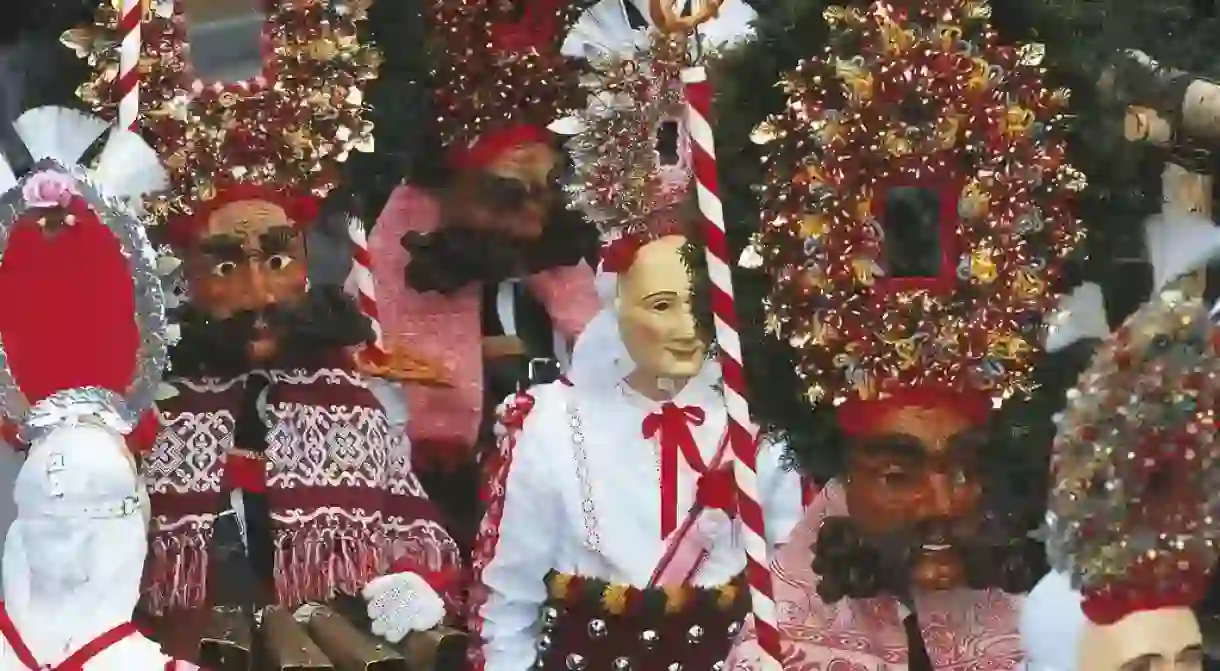Wacky Happenings You'll Witness Only in Austria

Although known for being a country to produce many great inventions, such as psychoanalysis and slo-mo, Austria also has an eccentric and superstitious side. From colourful carnival traditions to summer solstice mountain fires, here are a few unusual events you may witness on your travels.
Tipsy on a Sunday morning
In many parts of the world, people spend Sunday mornings wanting to be as far away from alcohol as physically possible, with the mere smell of beer provoking wails of protest. And beyond the symbolic swig of red wine at communion, alcohol generally isn’t mentioned in the same breath as churchgoing. However, drinking a pint (or two or three) after church is part of a tradition in Austria known as Frühschoppen, which is still practised in some rural parts of the country. The boozy tradition involves the churchgoers meeting up in an inn or tavern to gossip over drinks and brunch. It has declined in recent years, mostly due to the decrease in regular churchgoers.

Imst Schemenlaufen
This century-old tradition, native to Tyrol, involves around 1,000 young men dressing up in elaborate costumes of masks and headdresses to mark the transformation from boy to man. The young lads take on various different characters, such as Roller, who symbolises elegance and strength, and parade around in a mystical fashion. Held every four years, the event is an elaborate spectacle that takes months of planning and is taken seriously by the locals. The next event is scheduled for February 2020.

Wampelerretien
Located just a stone’s throw away from the charming city of Innsbruck, you’ll find the inconspicuous village of Axams, home to one of Austria’s strangest traditions: Wampelerreiten. This annual event involves a gathering of young men wearing black hats, masks and white shirts stuffed with hay. Dressed in this unusual attire, the men (who are known as Wampeler, or fat bellied men) fight with other men (Reiter, or riders) and aim to dirty up the clean white shirts. Be sure to get involved, as there’s nothing quite like it.
Tyrolean carnival customs
The Muller and Matschgerer run, taking place in the areas surrounding Innsbruck, sees locals and tourists gather for a singing and dancing extravaganza on the streets and waiting in sub-zero temperatures for the passing of the magnificent carnival floats that cut through the drab winter sky with explosions of colour and energy. The towns of Rum, Thaur, Absam and Mils organise the most outlandish processions every other year.
Solstice celebrations
The summer solstice, which marks the longest day of the year, is celebrated worldwide, with England’s legendary Stonehenge gatherings an age-old custom. In Austria, and specifically in Tyrol, this time of the year sees the rugged mountains erupt in colour, with around 8,000 fires burning brightly in the wilderness. Considered by UNESCO to be one of the country’s cultural heritages, this event is at its most beautiful witnessed from the Nordkette mountains.
Krampus
Ordinarily, Christmas festivities inspire joyous images of a rosy-cheeked Santa Claus and angelic creatures. However, the Krampus, a horned, sharp-fanged half-goat, half-demon, takes a key role during Christmas celebrations in Austria, as well as in other places around Europe. He is primarily used as a deterrent for naughty children, and is something akin to the opposite of Saint Nicholas, who gives out gifts and food, while the Krampus gives out coal. December 6 is the day of The Feast of St Nicholas in Austria, and sees people parading the streets dressed up as this devilish creature.

Styrian yodelling
Austrians, or specifically Styrians, enjoy a spot of the ancient art of yodelling, which is one of the oldest forms of communication. It probably came about to enable herders to call to their animals over long distances, or so that people could communicate between villages.














